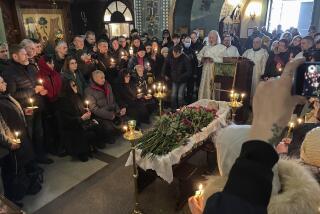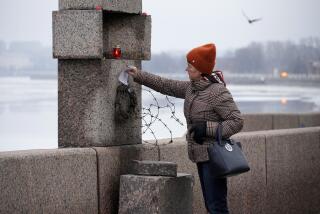Sub Crew’s Kin Voice Fury, Grief to Putin
- Share via
MURMANSK, Russia — Grieving relatives of the 118 seamen who died aboard the Russian nuclear submarine Kursk poured out their rage and pain in a heated meeting Tuesday night with President Vladimir V. Putin at a closed military base near the site of the tragedy.
Putin, struggling to recover from his worst political crisis since he was sworn in last May, took the desperate step of confronting the fury of the bereaved--a rare move for a Russian political leader.
After promising compensation and housing, Putin fielded difficult questions during a 90-minute meeting carefully controlled to keep out all media except the pro-Kremlin RTR state television network.
“It was a tough meeting. Everyone wanted to know how come our children ended up in this tin can for the paltry money that they’re paid,” said Nadezhda Tylik, whose son was aboard the Kursk. “The meeting was saturated with the feeling of pain, grief and the tremendous loss of the relatives.
“People wanted to know how the government is planning to lift that submarine where our children and husbands are,” said Tylik, whose 24-year-old son, Sergei, left a wife and an 11-month-old daughter.
The families expressed anger at Putin’s decision to stay on vacation for nearly a week after the submarine went down in the Barents Sea on Aug. 12. And they criticized the government’s delay in requesting foreign rescuers until last Wednesday.
The meeting hall was crammed, with the crowd estimated at slightly fewer than 1,000 people. Among them were about 350 relatives of Kursk crew members. Many people were forced to stand in the aisles.
Tylik’s account of the meeting, which was held at a closed naval base in Vidyayevo near Murmansk in northern Russia, was backed by Russian navy Capt. Alexander Zhuravlyov and RTR journalist Ivan Konovalov, both of whom were present.
Since his return from vacation Saturday, Putin has sought to control the political and public relations damage facing his government because of the naval tragedy.
The large crowd that gathered soon after 4 p.m. Tuesday was forced to wait more than five hours in the rain before the meeting finally started. Marines from a neighboring base were bused in to control the crowd.
Some people in the crowd gave up waiting; others in Vidyayevo expressed such disillusion with Putin that they did not turn out at all.
Among them was Vladimir Chaikin, a senior sublieutenant who has served on Russian submarines for 11 years. He voted for Putin in this year’s presidential election but said Tuesday that he never wants to look at the leader’s face again.
“Putin is doing exactly the opposite of what he should,” Chaikin said. “He doesn’t arrive when his presence is crucial, but he shows up when no one wants to see him.
“What does Putin think his mission is in Vidyayevo?” Chaikin said earlier Tuesday. “He’s going to look in the eyes of the mothers killed by grief, but it will only reopen their wounds.”
In a telephone interview after the Tuesday night meeting, Tylik said she was doubtful that the money and housing promised by Putin will be delivered.
“In my opinion, the meeting was confined to just empty words,” she said. “When the tragedy is over, all the doors will be shut on us and no one will want to help us solve our problems.
“It will happen again, just as it happened thousands of times before,” she added. “And whatever anyone says or does now, no one will ever be able to bring my son back.”
Putin knew that he was flying in for a potentially explosive meeting after a series of emotional confrontations between Russian officials and grieving relatives in recent days.
“People are very tense. They’re almost hysterical. A woman who was all in tears, literally on the edge of collapse, threw herself at [Deputy Prime Minister Ilya I.] Klebanov today,” said Elina Gorelov, the wife of a Kursk officer. Klebanov is leading a government commission assigned to investigate the catastrophe.
“She was flailing her fists in the air,” Gorelov said of the Monday confrontation. “A lot of people were ashamed to see it, but even those who felt ashamed felt the same way she did.”
After the meeting with Putin, Tylik said: “The government was procrastinating on doing everything possible to save our boys. They must have been thinking about their own prestige and not the sailors’ lives.”
However, Zhuravlyov said he believed that Putin had found the necessary words to comfort people and that relatives and residents left the meeting with a sense of certainty and completion.
“There was also bitterness on their faces, the bitterness for their lost loved ones,” the navy captain said.
Only a short scrap of television footage of the meeting was aired late Tuesday, showing families looking grim. No words were broadcast.
Before the meeting, Putin went to a shabby apartment block with peeling paint where he met the widow and family of the submarine commander, Gennady Lyachin.
Despite Putin’s efforts at damage control, he continued to take a beating in the media Tuesday. But the patriarch of the Russian Orthodox Church, Alexi II, came to his defense, saying the president and the government were doing everything they could to help the families of the dead.
“Steel your hearts and forgive,” he said.
The mood across the country Tuesday was somber. People were lighting candles in churches. Television footage showed one man sitting in a gutter in St. Petersburg, weeping inconsolably, with a woman awkwardly touching his back to offer comfort. The Russian Cabinet stood for a minute’s silence to mark the tragedy, in which 55 children lost their fathers.
Television stations Tuesday displayed the names of the dead and showed old footage of the 500-foot Oscar II-class submarine sailing out of port, its crew at attention on deck. Classical music and mournful folk ballads accompanied the film.
Putin declared today a day of national mourning, in a message that expressed “sorrow for those killed and condolences to their relatives and friends.” Flags will be lowered to half-staff, and all television and radio stations will be asked to cancel entertainment programs out of respect for the seamen.
The navy reportedly agreed to take mourning relatives to visit the site of the sinking today aboard a hospital ship. After the visit, the navy will encourage the relatives to go home.
“It will take at least a month to raise the submarine and extract the bodies, and we are going to try to explain to the families of the dead men that it will serve no purpose for them to wait all that time,” Vladimir Navrotsky, a spokesman for the Northern Fleet, which is based in Severomorsk, told a news conference in nearby Murmansk.
Despite the risks and uncertainties of a recovery operation, Deputy Prime Minister Klebanov promised a group of relatives Tuesday: “We’ll get them all out, every last one of them.”
But with the Arctic winter approaching, Norwegian officials have questioned whether any effort to retrieve the sub and its crew can be made before spring.
The Norwegians are considering a Russian request to attempt a recovery of the bodies. Russian officials have also said they will seek foreign donations to help raise the sub. Both projects probably would be dangerous, and neither has yet been determined to be possible.
Norwegian and British deep-sea divers who entered the sunken submarine Monday and confirmed that the vessel was flooded left Russia on Tuesday, as did a British submersible sent to help in rescue efforts.
As they left the site of the sinking, a crew member of the British LR5 submersible tossed a small bouquet into the sea.
Meanwhile, Russian Defense Minister Igor D. Sergeyev insisted Tuesday that the military had made “no fundamental mistakes” in the failed rescue effort. He said it was he who had advised Putin not to end his Black Sea holiday and added that he remained convinced that it was the right move.
“I would like to say that the whole nation and, above all, ourselves, who bear full responsibility for what happened, we grieve together with the relatives and the close ones,” he said.
*
Dixon reported from Murmansk and Boudreaux from Moscow. Alexei V. Kuznetsov of The Times’ Moscow Bureau contributed to this report.
More to Read
Sign up for Essential California
The most important California stories and recommendations in your inbox every morning.
You may occasionally receive promotional content from the Los Angeles Times.










